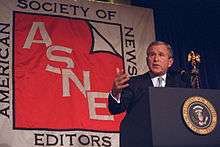American Society of News Editors
The American Society of News Editors (ASNE) is a membership organization for editors, producers or directors in charge of journalistic organizations or departments, deans or faculty at university journalism schools, and leaders and faculty of media-related foundations and training organizations.[2]
 | |
| Abbreviation | ASNE |
|---|---|
| Motto | Leading America's Newsrooms |
| Formation | 1922[1] |
| Type | NGO |
| Purpose | Journalism-related and First Amendment issues[2] |
| Headquarters | Reynolds Journalism Institute at the Missouri School of Journalism in Columbia, Missouri.[3] |
President | Nancy Barnes |
| Website | www |
Formerly called | American Society of Newspaper Editors |
History
The American Society of Newspaper Editors formed after two United States publications took the newspaper industry to task. In January 1922 The Atlantic Monthly featured two articles by Frederick Lewis Allen and Moorfield Storey were critical and requested change in how newspapers were published. After reading the articles Casper Yost saw the need for forming an organization of editors willing to combat criticism.[4]
Yost wrote to a few dozen editors soliciting support. The responses were positive and, just a month later, in February 1922, a small meeting was held in Chicago. Attendees included Yost and editors from Cleveland, Detroit and Chicago. They gathered to discuss action they could take for the advancement of the news and editorial side, to develop a constitution and a code of ethics and to launch a recruiting campaign for the group. The editors called a meeting in New York that April, when editors would be joining their publishers and congregating for the annual ANPA meeting (despite no formal mention of them by ANPA in its bulletins). Their efforts were so successful that by October nearly 100 charter members had signed up.
The organization amended its bylaws and changed its name to the American Society of News Editors in April, 2009.[5]
Organizational goals
In October 1922, ASNE was launched with directors and officers; they hammered out a code of ethics, named committees and made preparations for the first convention at the New Willard Hotel in Washington the next April. The founders decided that ASNE would be an organization of individual editors of big-city papers — limiting membership to editors of newspapers in cities of 100,000 or more. Since then, rules have been loosened extensively.
Annual meetings

The convention is held annually - with the exception of 1945 and 2009 - mostly in Washington.
Every U.S. president has spoken at the organization's convention and it is considered a premier venue for politicians to appear. Notable examples are President Coolidge's Press Under a Free Government speech[6] and President Eisenhower's Chance for Peace speech.
Activities
ASNE has several initiatives carried out by its committees. The Diversity Committee was formed to evaluate employee diversity using the Newsroom Employment Census. The census queries every daily newspaper and online news site in the United States to determine the number of news staffers as well as their gender and race as part of the organization's yearly census.
Awards
The ASNE Awards are another key initiative of the organization. They include the Batten Medal, the Osborn Award for Editorial Leadership, the Sulzberger Award for Online Storytelling, the Howell Award for Nondeadline Writing, the Royko Award for Commentary/Column Writing, the Distinguished Writing on Diversity Award, the Local Accountability Reporting Award, the Community Service Photojournalism Award and the Breaking News Writing award.[7]
Projects
ASNE also runs several projects, generally carried out by staff with advice from committees. Projects subject areas have included diversity, credibility and readership.
The association started the national Sunshine Week initiative promoting the importance of open government. Sunshine laws were enacted to make sure journalists have access to all government meetings.
References
- "About". American Society of News Editors. Archived from the original on January 2, 2012. Retrieved December 16, 2011.
- "ASNE's Mission Statement". American Society of News Editors. August 27, 2009. Retrieved December 16, 2011.
- "ASNE Moves to University of Missouri In New Partnership". American Society of News Editors. Archived from the original on May 21, 2012. Retrieved April 24, 2012.
- Storey, Moorfield (1922). "The Daily Press". The Atlantic Monthly. Vol. 129. Retrieved October 10, 2011.
- http://asne.org/blog_home.asp?display=515
- "The Press Under a Free Government: Address before the American Society of Newspaper Editors Washington, D.C." The American Presidency Project. January 17, 1925. Retrieved April 1, 2015.
- http://asne.org/content.asp?pl=30&sl=15&contentid=227